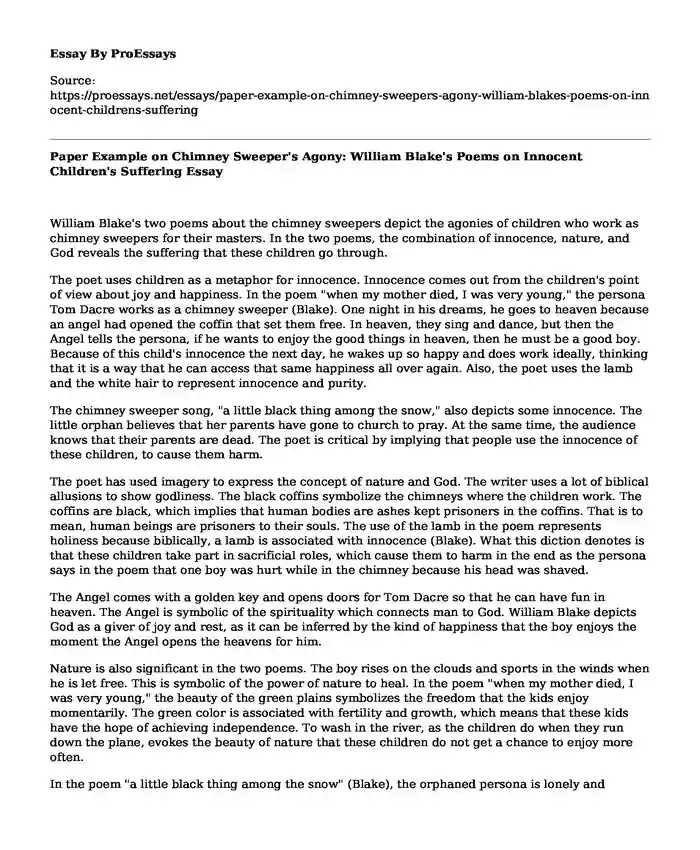William Blake's two poems about the chimney sweepers depict the agonies of children who work as chimney sweepers for their masters. In the two poems, the combination of innocence, nature, and God reveals the suffering that these children go through.
The poet uses children as a metaphor for innocence. Innocence comes out from the children's point of view about joy and happiness. In the poem "when my mother died, I was very young," the persona Tom Dacre works as a chimney sweeper (Blake). One night in his dreams, he goes to heaven because an angel had opened the coffin that set them free. In heaven, they sing and dance, but then the Angel tells the persona, if he wants to enjoy the good things in heaven, then he must be a good boy. Because of this child's innocence the next day, he wakes up so happy and does work ideally, thinking that it is a way that he can access that same happiness all over again. Also, the poet uses the lamb and the white hair to represent innocence and purity.
The chimney sweeper song, "a little black thing among the snow," also depicts some innocence. The little orphan believes that her parents have gone to church to pray. At the same time, the audience knows that their parents are dead. The poet is critical by implying that people use the innocence of these children, to cause them harm.
The poet has used imagery to express the concept of nature and God. The writer uses a lot of biblical allusions to show godliness. The black coffins symbolize the chimneys where the children work. The coffins are black, which implies that human bodies are ashes kept prisoners in the coffins. That is to mean, human beings are prisoners to their souls. The use of the lamb in the poem represents holiness because biblically, a lamb is associated with innocence (Blake). What this diction denotes is that these children take part in sacrificial roles, which cause them to harm in the end as the persona says in the poem that one boy was hurt while in the chimney because his head was shaved.
The Angel comes with a golden key and opens doors for Tom Dacre so that he can have fun in heaven. The Angel is symbolic of the spirituality which connects man to God. William Blake depicts God as a giver of joy and rest, as it can be inferred by the kind of happiness that the boy enjoys the moment the Angel opens the heavens for him.
Nature is also significant in the two poems. The boy rises on the clouds and sports in the winds when he is let free. This is symbolic of the power of nature to heal. In the poem "when my mother died, I was very young," the beauty of the green plains symbolizes the freedom that the kids enjoy momentarily. The green color is associated with fertility and growth, which means that these kids have the hope of achieving independence. To wash in the river, as the children do when they run down the plane, evokes the beauty of nature that these children do not get a chance to enjoy more often.
In the poem "a little black thing among the snow" (Blake), the orphaned persona is lonely and spends much of his time playing in the snow because he has no companion. It is in the snow that this child finds peace as the poem says, "And smil'd among the winter's snow."
The writer uses the aspect of God and nature to explore the exploitation the children who wash chimneys go through. God has been symbolically used to mean hope for these children and, at the same time, to symbolize their source of suffering. It is in nature that these children find peace. People exploit children because of their innocence.
Works Cited
Blake, William. The Chimney Sweeper: A Little Black Thing Among the Snow. 9 May 2001, www.poemhunter.com/poem/the-chimney-sweeper-a-little-black-thing-among-the-snow/.
Blake, William. The Chimney Sweeper: When My Mother Died I Was... www.poetryfoundation.org/poems/43654/the-chimney-sweeper-when-my-mother-died-i-was-very-young.
Cite this page
Paper Example on Chimney Sweeper's Agony: William Blake's Poems on Innocent Children's Suffering. (2023, Oct 30). Retrieved from https://proessays.net/essays/paper-example-on-chimney-sweepers-agony-william-blakes-poems-on-innocent-childrens-suffering
If you are the original author of this essay and no longer wish to have it published on the ProEssays website, please click below to request its removal:
- Essay Example on Evaluation of Mary Shelley's Frankenstein
- Animal Farm by George Orwell Essay
- Critical Essay on Changes in the "Little Sister Born in This Land"
- Historical Approach to Langston Hughes Poem ''The Backlash Blues''
- Fathered by a White Landowner: Fredrick Douglass's Journey - Essay Sample
- Macbeth: An Exploration of Remarkable Character Evolution Through Political Ambition - Essay Sample
- Essay Example on Hamlet's Unrequited Love for Ophelia: A Tragic Tale







